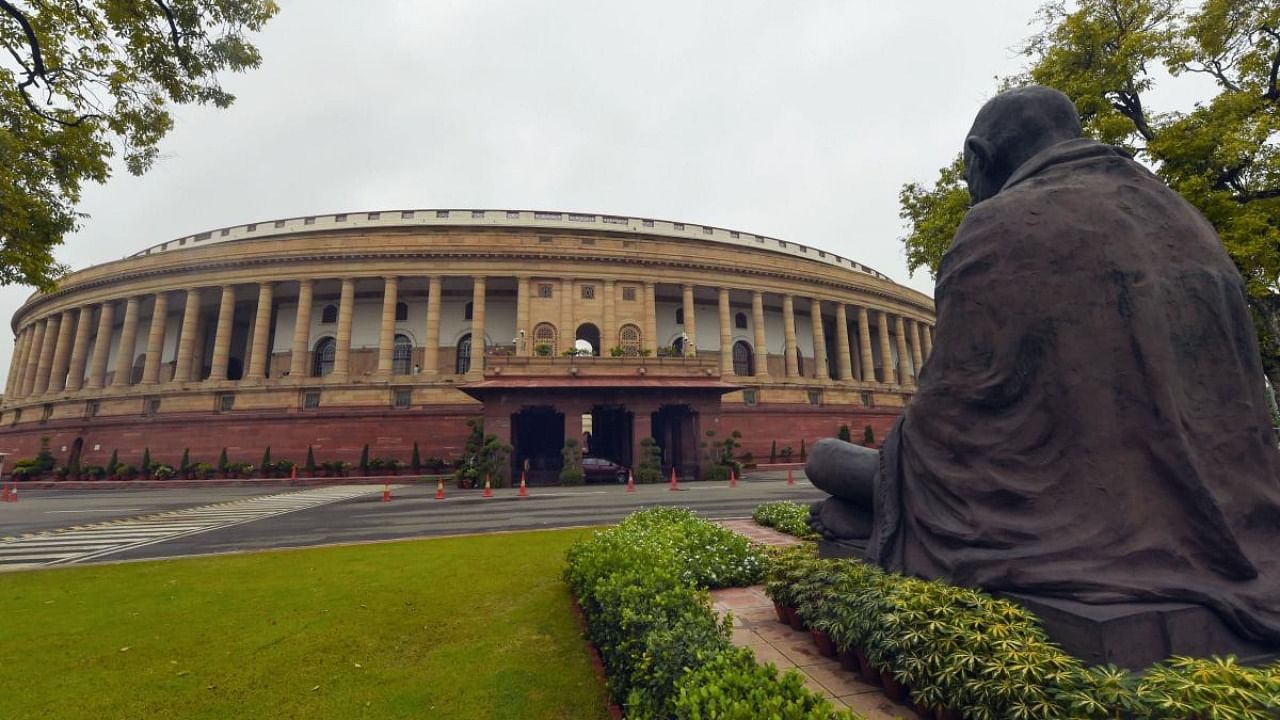
As the second leg of the Budget Session began on Monday, the BJP leaders attacked Rahul Gandhi over his "insulting" remarks on democracy in London and demanded an apology from the Congress leader on the floor of the House.
Gandhi had recently alleged in London that the structures of Indian democracy are under brutal attack and there is a full-scale assault on the institutions of the country. The row over Gandhi's remarks in Britain seeking intervention of the US and European nations over “disappearing” democracy in India disrupted proceedings in the Lok Sabha and Rajya Sabha with BJP as well as Congress leaders engaging in a war of words.
In Rajya Sabha, Leader of the House and Union Minister Piyush Goyal on Monday said an Opposition leader talked "rubbish" about Indian democracy in a "shameful manner" in a foreign country. "He makes allegations against the Indian press, Indian judiciary, Indian media, election commission and the Indian Army," Goyal said, demanding an apology. To this, Leader of Opposition Mallikarjun Kharge responded strongly and referred to Modi's statement in China abroad, which he claimed was insulting. He questioned how an issue concerning a member of Lok Sabha be raised in Rajya Sabha, which is against rules. Kharge also raised a point of order citing 1967 and 1983 rulings by the Rajya Sabha chairman prohibiting members from using freedom of speech to make “make allegations and charges against members of other House”.
So, what is a point of order?
A point of order is one of the "most vexatious parliamentary practices" which confronts a Presiding Officer during a debate. It is a point relating to the interpretation or enforcement of the Rules of Procedure or such articles of the Constitution for regulating the business of the House. Whenever a point of order is raised, the Chair is bound to hear at least a substantial part of a member's submission to rule that it is not a point of order.
Any member can bring to the Chair's immediate notice any instance of what he considers a breach of order or a transgression of any written or unwritten law of the House which the Chair has not perceived, and he may also ask for the guidance and assistance of the Chair regarding any obscurities in procedure.
A point of order should, relate to the interpretation or enforcement of the Rules of Procedure and Conduct of Business in Rajya Sabha or conventions or such articles of the Constitution as to regulate the business of the House and must raise a question which is within the cognizance of the Chair. The test whether a point raised is a point of order or not is not whether the Chair can give any relief but whether it involves such interpretation or enforcement of the rules, etc. and whether it raises a point which the Chair alone can decide.
Matters on which the Chair cannot give any relief should not be the subject of a point of order. Should a member desire to have a clarification from a Minister or object to any statement which a Minister might have made, he should say so in the House with the permission of the Chair and should not raise it in the garb of a point of order.
What are the provision in Rajya Sabha Rules regarding points of order?
Rule 258 of the Rules of Procedure and Conduct of Business in Rajya Sabha makes a provision to enable a member to raise a point of order. It provides as follows:
(1) Any member may at any time submit a point of order for the decision of the Chairman, but in doing so, shall confine himself to stating the point.
(2) The Chairman shall decide all points of order which may arise, and his decision shall be final.
How can one raise a point of order?
A member who has a point of order should stand up and say, "Point of Order", and should not proceed to formulate it until he is identified by the Chair. Only after he has been identified, he should proceed to speak on his point of order.
While formulating his point of order, a member should quote the specific rule or the provision of the Constitution relating to the procedure or neglected or violated. No member should
rise or speak, when the Chair is on his feet. The Chair should be heard in silence and any member wishing to speak should rise only after the Chair has sat down and has called the member to speak.
For example, on Monday, Kharge cited a ruling given by late V V Giri on June 19, 1967, that "a member of one House should not use the freedom of speech on the floor of the House to make allegations or charge against the members of the other House" and another one made on March 17, 1983, by the then Vice-Chairman in favour of L K Advani which stated that "before referring to a member of the other House, one has to exercise a lot of care and caution". "Therefore, whatever he (Goyal) said should be expunged," Kharge said. Meanwhile, Goyal argued that he had not named any one and therefore had broken no rule. Dhankhar reserved his ruling on Kharge’s point of order.
What happens after a point of order is raised?
The point of order, when raised, has the effect of suspending the proceedings before the House. On a point of order being raised, the member who is speaking at that time must give way and resume his seat. No debate is allowed on a point of order.
A point of order can be raised only in relation to the business before the House at the moment. The term 'business before the House' means business included in the list of business for the day. When two or more points of order are raised on a subject-matter, the Chairman may take them one by one and give his ruling. The Chair may reserve his ruling on a point of order and may deliver it on a later date.
Members cannot protest against the Chair's ruling.
